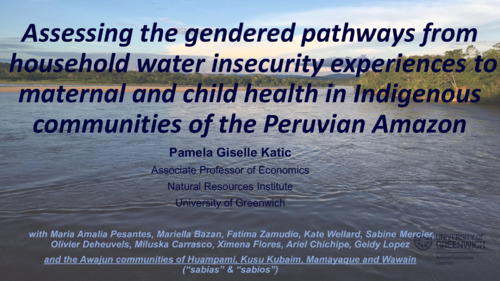Assessing the gendered pathways from household water insecurity experiences to maternal and child health in Indigenous communities of the Peruvian Amazon
Abstract
Indigenous Peoples’ food systems are inextricably connected to land, which in turn is interwoven with issues of self‐determination, livelihoods, health, cultural and spiritual heritage, and gender. While mounting evidence shows that food security and nutrition are negatively affected by water insecurity, experiential water security measures have not yet been used to explore relationships with other outcomes of public health interest. We therefore sought to fill this knowledge gap by quantifying the relationship between household water and food insecurity and maternal and child health outcomes (maternal and child anaemia, child stunting, and maternal body mass index). We also aimed to determine whether sociocultural norms, women’s time use, and economic well-being mediated these relationships. Data were drawn from a Newton Fund project working with Awajun women in the Peruvian Amazon and analyzed using generalized structural equation models. Our results highlight the need for economists (and other researchers alike) to measure water security using indicators that are close to maternal experiences with water, and culturally and contextually grounded, to enable a complete understanding of how water insecurity relates to food security, nutrition, and many other indicators of health and well-being.

